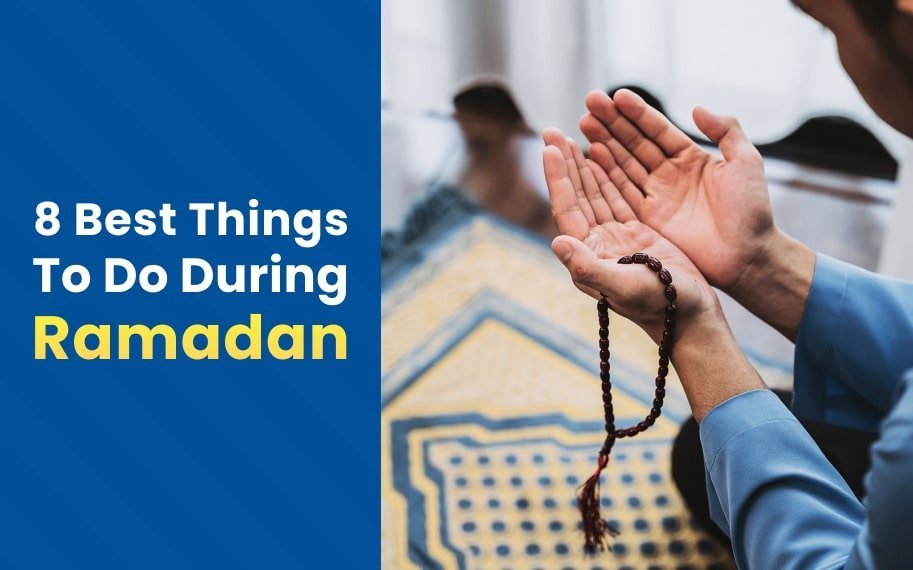
Ramadan, the holiest month in the Islamic calendar, is a time of spiritual reflection, self-discipline, and communal unity. As Muslims around the world prepare to observe Ramadan in 2024, it’s essential to focus on both personal growth and community engagement. Here are 8 meaningful activities that can enhance your Ramadan experience and deepen your connection with faith and community.
Table of Contents
Fasting with Intention
Fasting during Ramadan is not just about abstaining from food and drink. It’s an act of self-discipline that extends beyond the physical realm. Take time each day to reflect on the purpose of fasting – to develop empathy for those who go hungry daily, to exercise self-control, and to express gratitude for the blessings in your life. Consider keeping a journal to document your thoughts and emotions throughout the month.
Nightly Tarawih Prayers
Tarawih prayers are a unique and spiritually uplifting aspect of Ramadan. Attend the nightly Tarawih prayers at your local mosque or organize a virtual gathering with friends and family to pray together.
Quran Recitation and Reflection
Set specific goals for Quranic recitation and reflection. Whether you aim to complete the entire Quran during the month or focus on understanding specific verses, the key is to establish a consistent routine. Joining a Quran study group or online discussion forums can provide valuable insights and foster a sense of communal learning.
Acts of Charity
Engage in a variety of charitable activities. Beyond financial contributions, consider volunteering your time to local organizations or participating in community service projects. Acts of kindness, no matter how small, can have a profound impact on both the giver and the receiver. Keep a “Ramadan Acts of Kindness” calendar to track your daily contributions.
Iftar Gatherings
Iftar gatherings are an excellent opportunity to strengthen community bonds. Host or attend iftar events, and encourage everyone to bring a dish to share. Consider rotating these gatherings among different households or community spaces to ensure inclusivity and foster a sense of unity.
Dua and Reflection Time
Allocate a specific time each day for personal reflection, supplication, and seeking forgiveness. This dedicated time allows for a deeper connection with Allah. Reflect on personal goals, express gratitude for blessings, and seek guidance for challenges. A serene environment and a consistent routine can enhance the effectiveness of this spiritual practice.
Family Bonding Time
Prioritize quality time with family. Plan activities that promote bonding, such as family iftar nights, group prayers, or storytelling sessions about Islamic history. Create an atmosphere that nurtures open communication and understanding, reinforcing the importance of family values during this sacred month.
Digital Detox and Mindful Living
Consider a partial or complete digital detox during Ramadan. Minimize time spent on social media and other online platforms, redirecting that time towards spiritual activities and genuine connections. This intentional step toward mindfulness allows for a more profound engagement with the essence of Ramadan.
Conclusion
Approach Ramadan 2024 with a holistic mindset, incorporating these 8 activities into your daily routine. Each of these practices aims to deepen your connection with spirituality, strengthen bonds within the community, and contribute positively to the world around you. May this Ramadan be a transformative experience, fostering personal growth and unity among Muslims worldwide.
FAQs
1. Why is intentional fasting important during Ramadan?
Intentional fasting during Ramadan goes beyond abstaining from food and drink. It involves cultivating mindfulness, gratitude, and empathy for those less fortunate. This practice helps individuals develop self-discipline and a deeper connection with the spiritual essence of the month.
2. What are some achievable goals for Quranic recitation during Ramadan?
Set realistic goals for Quranic recitation during Ramadan based on your schedule. For example, aim to complete one Juz’ (section) of the Quran every week or focus on specific chapters that resonate with you. The key is to be consistent and engage in reflection.
3. How can I engage in acts of charity beyond monetary donations?
Engaging in acts of charity beyond monetary donations involves volunteering time at local organizations, participating in community service projects, or organizing activities like neighborhood cleanups. Acts of kindness, compassion, and service contribute significantly to the spirit of Ramadan.
4. How can I make dua and reflection time more meaningful?
Make dua and reflection time more meaningful by creating a dedicated and distraction-free environment. Reflect on personal goals, express gratitude, and seek guidance during these moments. Consistency and intentionality will enhance the impact of these spiritual practices.
5. What are some effective ways to engage in continuous learning during Ramadan?
Engaging in continuous learning during Ramadan can involve attending local lectures, workshops, or online seminars. Joining Quran study groups, book clubs, or educational forums allows for a communal approach to learning and enriches your understanding of Islamic teachings.
6. How can I successfully implement a digital detox during Ramadan?
Implementing a digital detox during Ramadan involves setting boundaries for social media and online activities. Designate specific times for technology use, redirecting the saved time towards spiritual activities, family, and community engagement. A gradual reduction can make the transition smoother.
Read Also
How to Finish the Quran During Ramadan?
How to Spend Your Ramadan – A Spiritual Journey
Benefits of Fasting in Ramadan
Ramadan – 9 Historical Events in the Holy Month
Memorize Quran Online at 10% Off – Ramadan Offer
Best Online Quran Classes in Ramadan 2024


